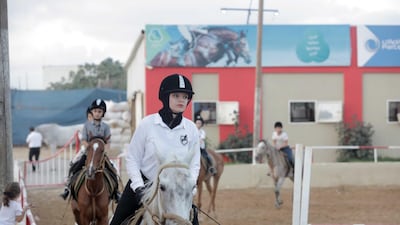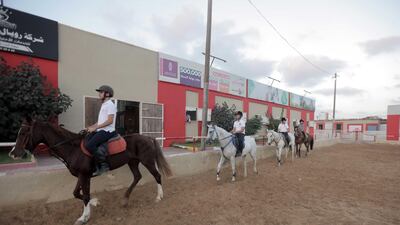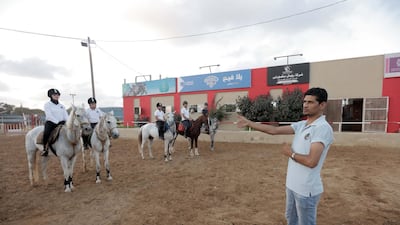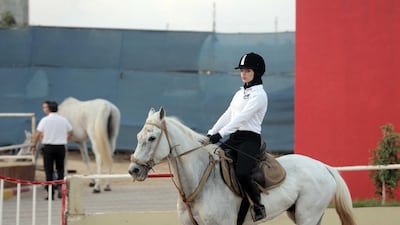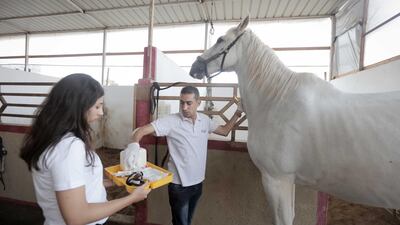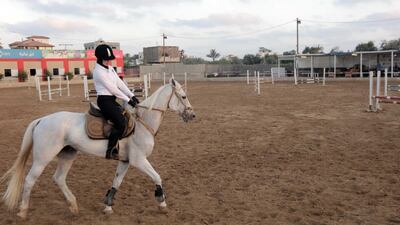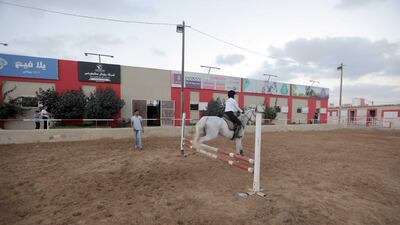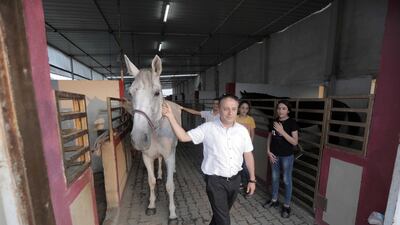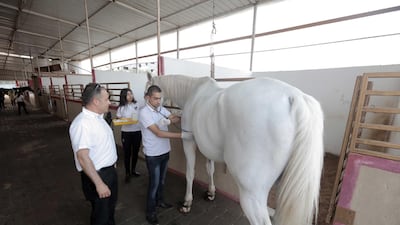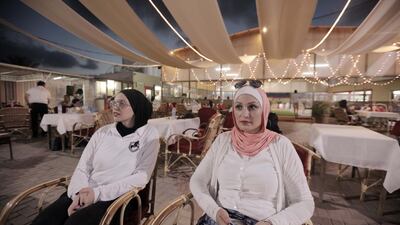A happy scene of young people dressed in jodhpurs and chaps, sitting on beautiful horses as they prance around a yard, is not what you'd usually associate with Gaza. But thanks to a group of locals, it is a common sight at several equestrian clubs that offer young people a distraction from the plight of living in Palestine.
Friends Equestrian Club
Haitham Shurrab, 49, owns a private pharmaceutical company and is a major distributor of medicine in the Gaza strip. He is also the head of the recently revamped Friends Equestrian Club. People can learn how to ride at the centre, which now has 160 members, while it also houses privately owned horses.
Look through the photo gallery above to see inside the club.
Last year, Shurrab joined a group of four others, comprising businessmen and amateur riders, to fund the construction and redevelopment of the club, with the project costing $350,000 (Dh1.29 million). But Shurrab says every last dollar was worth it.
"In the past, the club was modest so we decided to develop the place and expand it. We attracted new trainers and managed to convince many families to participate in the club and we succeeded."
Shurrab developed a love of riding almost by accident. It came after his younger brother, Saed, became a rider, with Shurrab's son, Mishal, taking a shine to his uncle's hobby. "On the day I decided to go with my brother and son to watch this sport, my son had a determination to learn," Shurrab says. "I was worried, so I decided to live the experience and learn horseback riding. I became so comfortable and convinced, and I developed my skills and loved this sport."
Shurrab joined the club and rose through the ranks to take over as its boss. That's when he decided it needed an overhaul. Some of the horses are local, while others, largely privately owned, have been brought in from countries such as Belgium and the Netherlands.
Club horses are purchased through merchants and brokers, and horses coming from Israel enter through the main commercial crossing between Gaza and Israel at Kerem Shalom.
Equine health in Gaza
But, as with the Palestinian people, life in Gaza is not easy for a horse. For a start, there are no vets specialising in equine health. Medicine has to be imported, while Google is often used to help deal with diseases or injuries.
"We lose a lot of special horses to injury and death," Shurrab says. "And here comes the problem of the lack of alternative horses and the difficulty of getting more. In just one year we lost seven.
"Horses are spirits that eat and drink and must be taken care of. How can we care for horses in an emergency or war? No one can get to this place easily during the bombing. The nature of the horses is sensitive and the conflict negatively affects their performance. The place can also be severely damaged in the wars – you do not know where a rocket will fall."
Nonetheless, Shurrab remains optimistic about the club's future. He now teaches riders between the ages of six to 60, while he's tried to keep fees cheap enough for anyone to join. He says 20 half-hour training sessions cost 200 new Israeli shekels (Dh207), or there's an option to pay $500 per year for unlimited access to the club.
__________
Read about another club providing relief for those in Gaza: Inside Gaza's new sports club for girls
__________
He says he hopes that one day Friends Equestrian Club will have a relationship with bigger international clubs, such as those in the UAE or even the UK. He wants his riders to one day be able to participate in Arab or international tournaments, or receive professional training.
'I can't imagine a day without coming to the club'
But for now, members are simply happy to be a part of the Gaza club.
Diala Al Madani, 18, has been a member for two-and-a-half years and says it has helped her to grow as a person.
"First, I practised a good sport for both mind and body, and I became more confident," she says. "I never imagined that one day I would be dealing with animals, but now I feel that the relationship between me and nature has improved."

Al Madani says she believes her riding has improved recently and looks forward to taking it further. Her whole life has become consumed by riding, she says, and the sport means a lot to her.
"I can't imagine a day without coming to the club. Even at home, I watch television programmes about horseback riding and I follow the social media pages that care about horses," she says.
"Also, I feel that I am releasing all of my negative energy in the club. The air that I breathe during horseback riding makes me feel different. I feel that I run away from the problems of life in Gaza."
Her mother, Sherine Abu Shaaban, agreed to let her join the club for that reason. As a child, Abu Shaaban also dreamt of learning to ride horses. "In the past there was no chance for girls to learn horse riding because of society and traditions," she says. "Now, all of my kids are practising this sport. Diala didn't like this sport at the beginning, but she had an ambition to ride horses like all the kids and now she is good and is working intensively to develop herself."
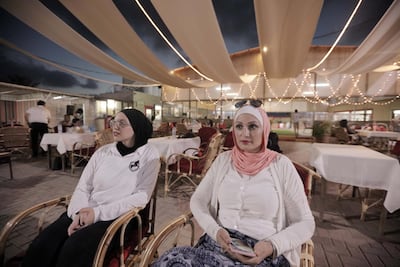
Abu Shaaban says she is, of course, worried about her daughter's safety, in case she falls from her saddle and is injured. But she says that seeing how happy it makes her daughter far outweighs her concerns. "Al Madani was an introverted and very shy person, now I feel she has become social and fun," she says. "She collaborates with her friends and welcomes people and is always smiling. I am so happy with it.
An outlet for negative energy
“Life in Gaza is not easy. We, as parents, have a lot of things on our shoulders. For example, we always try to find a place, space or outlet to help our children live a normal life.”
Abu Shaaban says she refuses to leave Gaza and loves her life there, despite the conflict. However, she's not blind to how it's affecting her children. But for now, she will continue to encourage them to "release their negative energy" through the help of horses. "Imagine a child born in 2000 with the beginning of the Intifada," she says.
"When he was eight years old, he witnessed his first war. When he was 12, he witnessed his second war. And when he became 14, he witnessed the war of 2014, which was devastating. The conflict still exists, that is why having an outlet or a place where we can help our children to release their negative energy is very important."
